#Joe Lancaster
Text
Asking Alexandria 2017, English rock band
Members:
Ben Bruce – lead guitar, backing vocals (2006–present); keyboards, programming (2008–2012)
James Cassells – drums (2008–present)
Cameron Liddell – rhythm guitar (2008–present)
Sam Bettley – bass (2009–present)
Danny Worsnop – lead vocals (2008–2015, 2016–present); additional guitar (2012–2015, 2016–present); keyboards, programming (2008–2012)
100+ Rock Band Posters and Canvas Prints
Print Option:
♦ Framed Poster Print
♦ Canvas Print
♦ Metal Print
♦ Acrylic Print
♦ Wood Prints
🌐 Worldwide shipping
#Asking Alexandria#Danny Worsnop#Ben Bruce#Denis Stoff#James Cassells#Cameron Liddell#Sam Bettley#Robin Everett#Joe Lancaster#Kieran Taffinder#Ryan Binns#rock band#The Irony of Your Perfection#Stand Up and Scream#Reckless & Relentless#From Death to Destiny#The Black#Like a House on Fire#See What's on the Inside#Where Do We Go from Here
3 notes
·
View notes
Text
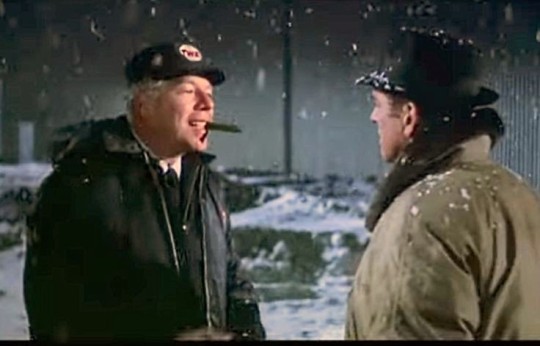
George Kennedy and Burt Lancaster in Airport (1970)
#george kennedy#burt lancaster#airport#joe patroni#old hollywood#hollywood#classic movies#old movies#70s movies#1970#disaster movie
5 notes
·
View notes
Text
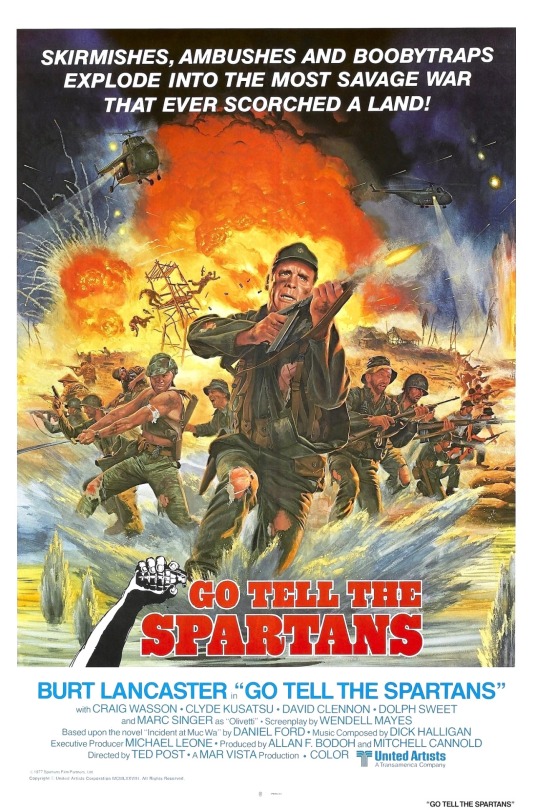
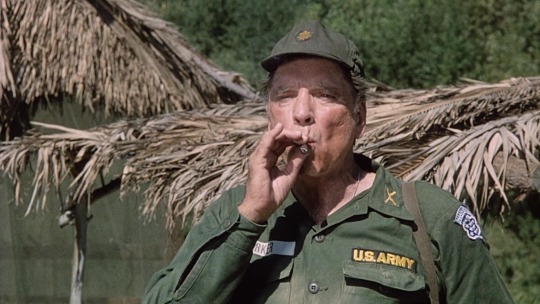

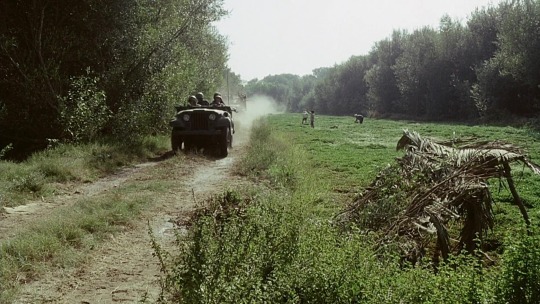
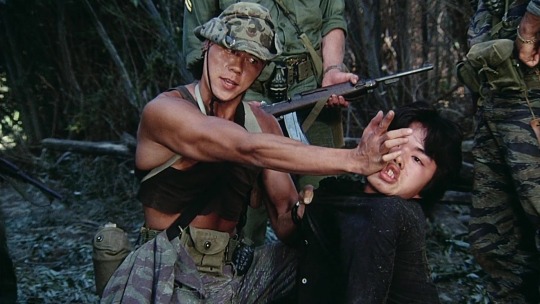



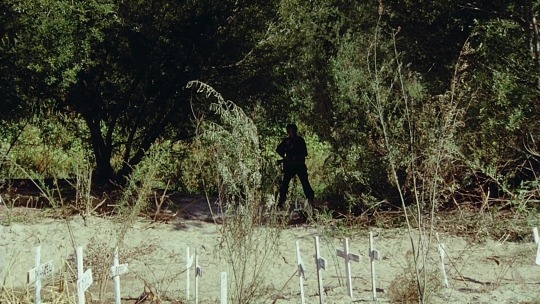



Go Tell the Spartans (1978, Ted Post)
7/31/23
#Go Tell the Spartans#Burt Lancaster#Craig Wasson#Clyde Kusatsu#David Clennon#Dolph Sweet#Marc Singer#Jonathan Goldsmith#Joe Unger#James Hong#70s#war#drama#Vietnam#Vietnam War#soldiers#army#military#jungle#heroism#communism
2 notes
·
View notes
Text
youtube
THE PROFESSIONALS (1966)
Grade: B-
Would be a cool re-make now or possibly an updated version. #BurtLancaster was great with #LeeMarvin. Good plot with a decent twist. Fun action movie. Shocked it's not brought up more for the great westerns. Definitely on the darker side and 3 years before "The Wild Bunch".
#The Professionals#1966#B#Action Film#Richard Brooks#Texas#Adventure Films#Drama Films#Burt Lancaster#Lee Marvin#Woody Strode#Robert Ryan#Claudia Cardinale#Jack Palance#Joe De Santis#Ralph Bellamy#Marie Gomez#Mexico#Youtube
2 notes
·
View notes
Text
#Field of Dreams#Kevin Costner#Amy Madigan#James Earl Jones#Ray Liotta#Frank Whaley#Burt Lancaster#Baseball#Black Sox#Shoeless Joe Jackson#Chicago Cubs#Cincinnati Reds#Reds Cubs#Dyersville#Iowa#Is this Heaven#No its Iowa#movies#film#movie review#movie#film review#movie critic#film critic#film criticism#movie criticism
1 note
·
View note
Photo



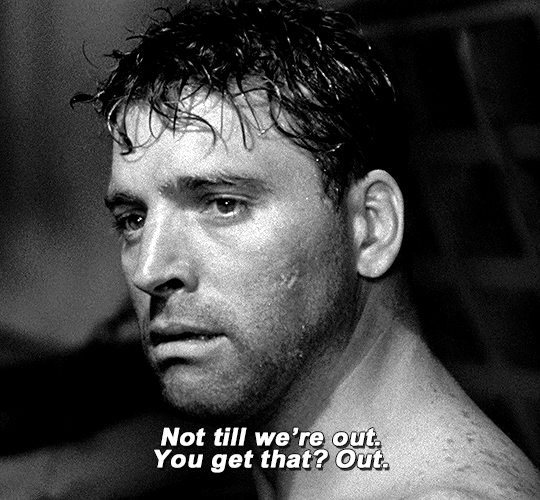
Burt Lancaster as Joe Collins
in Brute Force (1947) dir. Jules Dassin
#Brute Force#Burt Lancaster#Jeff Corey#John Hoyt#guys#movies#noirvember#gay subtext#*#**#filmedit#burtlancasteredit#ritahayworrth#usergina#albertserra#usertom#userjonah#holesrus#userlenie
2K notes
·
View notes
Photo



Burt Lancaster as Joe Collins
in Brute Force (1947) dir. Jules Dassin
#Brute Force#Jules Dassin#Burt Lancaster#1940s#film#ours#by michi#filmedit#usergina#albertserra#ritahayworrth#userdeforest#usertom#userkeanu#userjonah#uservini#useralex#userlenie
1K notes
·
View notes
Text
Before the Fall of Rome
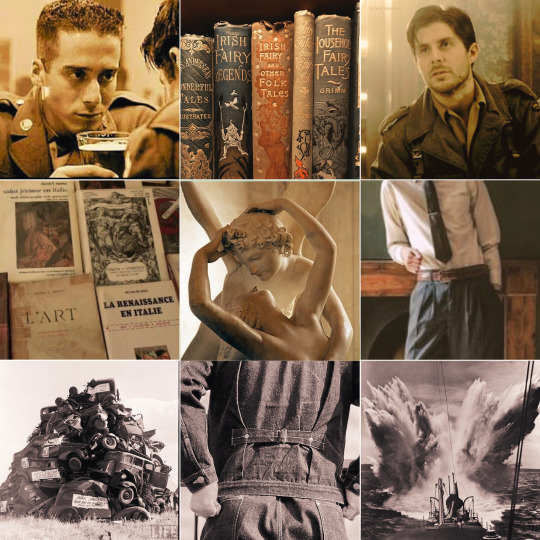
Merry Christmas @blood-mocha-latte from your Secret Santa! (me)
Hope you enjoy this fic, and your moodboards totally gave me the bug so I made one to go with this fic too :)) Rie, I had a blast writing this fic for you <33
Also here on AO3
Before the Fall of Rome, Luztoye, 2.2k, M
June, 1949. There's a reunion on the fifth anniversary of D-Day. George and Joe meet again for the first time since Bastogne.
June, 1949
George was outside smoking, leaning up against a plaster column in the shade. He was on his second cigarette when a busted cream-colored Willys pulled up in front of the hotel and Babe Heffron got out of the front seat, opening the door for a lady in the passenger seat. The lady in turn pulled open the back door and held out an inconspicuous arm for Bill Guarnere to pull himself up to standing. On the other side, Babe did the same with Joe Toye. George recognized him, but the set of his shoulders, the way he carried himself, had changed from the man George had jumped with.
Joe had a suitcase in one hand, a cane in the other, and walked purposefully towards the entrance to the hotel. George flicked the butt of his cigarette into the gravel drive and stepped into line with him, passing by the doorman holding the big door to the hotel.
“Hey Joe.”
Joe grunted.
“Ballroom’s down to the right. We’re all staying on the second floor mostly, and there’s an elevator back here,” George said, trotting alongside Joe. At the elevator Joe set down his suitcase and waited for Babe and the Guarneres to catch up after checking into the hotel, shifting his weight to one side and smoothing out a crease in his pant leg where it caught above the knee.
George remembered suddenly that this was the first time he’d seen Joe since Belgium, since the snow and the blood and as his throat tightened he smiled, wide, and said “I’d probably get you lost trying to find the room.”
He left Joe standing in the hallway with his shoulders slumped and his mouth a thin line and went to help set up the ballroom. It was still mostly empty, only the guys that organized the reunion had arrived. George was only there because he’d caught a ride with Winters, who was chronically early and terminally helpful.
Winters was different in civilian clothing, his hair just beyond regulation length, his shoulders and his smile looser. George had stopped by his house in Nixon, New Jersey, a hulking, empty brownstone with a shiny Cadillac parked in the garage. Nixon (the man) had driven in from the city and cooked them dinner both nights, pouring George and himself liberal glasses of vintage wines and retelling the same stories of his childhood they’d all heard through Toccoa and the war. He’d fallen asleep in the back of the Cadillac as Winters drove them to Pennsylvania and told George about the different farms they passed by.
“We’ve heard enough about cows, Dick,” Nix said blearily from the backseat, “Luz, what are you doing next?”
“I liked hearing about the cows, sir,” George deflected. He’d told them about the last four years, taking care of his little siblings and the seasonal jobs around town he’d been picking up. But Nix had his number and knew George had no idea for his future.
“I was thinking once Molly is in school I’d look into one of those job programs they have for soldiers. Learn a trade.”
“Trade work is good, Luz. You know, I put myself through college wiring telephone poles. I must have wired half of Lancaster County by the end of it,” Winters said. He glanced in the rearview mirror at Nixon, and George watched his face twist briefly before he looked back at the road.
In the ballroom Winters was directing Popeye and Tab in putting up a banner that read “506th PIR E Company” in a big red script, with “Currahee” underneath. Nixon was standing by a big table of food, some of it catered by the hotel, some of it brought by the wives and fiances of the men that had arrived. Nixon had made lemon icebox cookies the day before they left.
“Luz!” Someone behind him called out as George tried to filch a cookie from under Nixon’s nose. He turned around, wiping powdered sugar on his pants, and saw Lipton, smiling around his scar.
“And, well, we’re not telling people yet but Angie is expecting,” Lip said in an undertone, after he’d filled George in on the weeks since their last letter.
“Well tell her Uncle George is always available for babysitting. Lord knows your rugrats will be easier than the little Luzes.”
“Everyone’s easier to manage than Luz kids. That’s why they keep you around at home,” Lip joked, “You keep them out of trouble and they keep you busy enough you can’t get into trouble either.”
Lip made him promise to visit the boarding house before Angie gave birth, “Or we won’t have time to see you until the baby is in school,” and they made tenuous plans for the fall, before Lip went to talk to the other officers.
George chatted with Popeye and Moore when he arrived, and pulled Johnny Martin into a hug when he arrived. The light grew into sunset, and eventually Nixon officially opened the bar, everyone yelling over each other which drinks they wanted.
George had an Old Fashioned, in honor of the man himself, and another for confidence. By the time he was teetering between tipsy and drunk the sun had turned mellow and the room was hazy and dim. Men were dancing with their wives while others sat around talking. Winters made a brief statement standing on a chair, a glass of punch (miraculously no one spiked it) in his hand.
“I was proud to lead you into battle five years ago and I am proud of all that you have accomplished in civilian life, and the futures you have earned. Currahee!” he said, and they all cheered, and afterwards all the men had toasted each other until George was pushed up on the chair and wished them all luck in their lives after the war in Sobel’s marching cadence bellow. He’d done Sink and Dike and a big German caricature, and then mimicked a couple of movie stars, yelling orders or repeating old jokes from the war, before he was let down from the chair and handed another drink.
He watched Babe Heffron talking to Martin and his wife, a shadow hulking behind him. George went up to the shadow and tapped him on the shoulder.
“Luz, can’t you see I’m in the middle of a conversation,” Joe grumbled, following George to an empty table.
“You hadn’t said anything in five minutes.”
“You were paying attention?” Joe asked, his eyebrow quirked.
“I just couldn’t see Martin with you in the way, wanted to get another look at his behind,” he said, and Joe smiled, a little. He tilted his head down when he did, as though it was a secret.
He wasn’t sure how to approach the years of silence between them, but Joe cut through the awkwardness and asked, “So how many little siblings did you come home to?” and George got to tell him about Molly, who was three now, and his nieces and nephew, and being there to see baby Robbie walk for the first time.
“You could’ve seen me walk for the first time too,” Joe said, the first time either of them made reference to the war, “Babe was there. He was trying not to laugh the whole time. Don’t know how he and Bill are friends, they never stop fighting.”
“Philly’s still the same, then?”
“Guess so. When I left the hospital I tried to go back to the mines, but I couldn’t stand long enough. They tried to give me a paperwork job but I don’t have a head for numbers,” Joe said, his shoulders up by his ears again. It was unspoken in the company that not all the boys could read as well as each other– Bull Randleman was the smartest man in the company, but he would dictate letters home to Martin. Joe had left school at twelve. George’s ma had made all of them finish high school, and he was glad for that now.
“I’m um, I’m back in the city now. Taking some classes at the college. Bill’s wife helped me set it up, it’s free for GIs.”
“That’s good, Joe, real good,” George tried to hide his surprise, “What are you learning about?”
Joe spoke further into his beer, “History. When I got back I realized… We were part of something big. They’ll teach about us in school one day. I want it to be right.”
George imagined Joe sitting in a lecture hall, arguing with the professor.
“History is long. What’s the best part of it so far?”
“We read a book about Roman generals. They led these campaigns across the continent– they wouldn’t’ve needed paratroopers. The soldiers just marched,” Joe looked up, “This one fella, well, I guess he was an opposing general, he marched his elephants over the Alps.”
Joe’s laughter was low but bright, and George indulged another sip of his Old Fashioned, lest he think something untoward about his old friend.
“Sergeant Toye, you will brush that elephant until he shines. Do you expect to go to war with dusty tusks?” George affected in Sobel’s voice, attracting the other men towards their table.
Before Bill Guarnere and his wife (Frances, George reminded himself) went to bed he came over to shake hands with Joe and say goodnight. Joe took a minute for quiet words between them, while Frances politely invited George to visit them in Philly next time he was in the area. He got a sense that if she learned he’d been in Pennsylvania without gracing the Guarnere household he’d have a riot on his hands, and promised to call on them when he could.
“G’night Toye, Luz,” Bill said, and took his wife’s arm as they went back towards the rooms. George looked away, and caught Nixon and Winters in the corner of his eye, standing close together. Nixon had his arm wrapped around Winters’ shoulders, and for a moment his hand cupped the back of his neck, thumb brushing the divot between his skull and spine. So it was like that, George thought, and wondered why an invite into their house had been so readily given. Nixon was not a cautious man, but he guarded the things he regarded as his– dogs, peaches, wine cellars.
Joe caught him watching the officers, and he turned back to their conversation.
“I hadn’t planned to come,” Joe said, “I haven’t talked to any of them since Bill and I were in the hospital together. But Babe showed up with Bill and Fran and they would’ve left me alone, but… My brothers weren’t in the war.” George nodded, Joe had told them about the various illness or necessary labor jobs that had protected the other Toyes.
“I was lonely, I think. So when Babe showed up I went with him,” He said, and sat back, done with his piece.
George said, before his brain could catch up with him, ���Would you come with me now, if I asked?”
Joe nodded, and pushed himself up from the chair.
The prosthetic was easier to get off than he expected. Two buckles across his thigh, a snap connecting the harness to the wood, and Joe Toye was naked as the day he was born spread out across the floral pattern of George’s hotel bed.
George liked to tease, liked to talk and bite and argue, and he hoped they would have time for that, in the bright, impenetrable future they now had, in this time after the war. But Joe was a simple man to please, and the noises he made when George put his mouth on his cock were almost as good as his growl when George teased him to a point of rage. And George liked it pretty fucking well when he let himself draw the blowjob out a little long, until Joe pushed down on the back of his head and said, “Suck.”
Without speaking Joe curled himself behind George to sleep, his arm resting across George’s stomach.
“Goodnight, Joe,” George said. Joe grunted.
The next morning, after breakfast, George got back in Winter’s Cadillac, and went back East for the summer, waiting until Molly went to school and cleaning fish guts off his denim coveralls. He would receive letters in Joe’s stout, blocky handwriting, words scribbled out until everything was spelled correctly. In the fall he left again, and Joe Toye would pick him up at the train station. He would apologize for not having a car, and with his balance on the prosthetic he couldn’t take a bag from George either, but they walked together to the narrow apartment they would share until Joe got his teacher’s license.
George would work for one of Joe’s cousins (he would come to learn there were always more cousins) in the back of an autobody shop, mopping floors and sweeping up the screws and bolts scattered around. Joe taught history, and at night he would read to George from the books he consumed rapidly, and George would tell him they were Achilles and Patroclus, even with Joe’s Achilles Heel and all.
After the war, they continued.
33 notes
·
View notes
Text
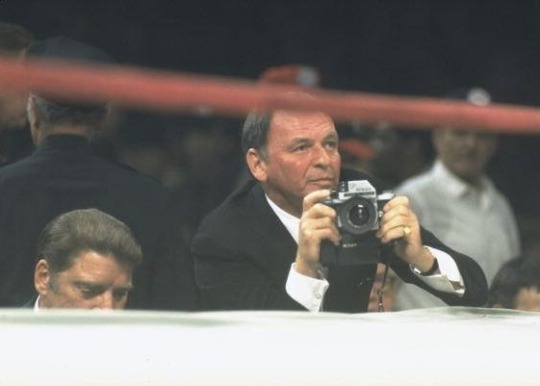

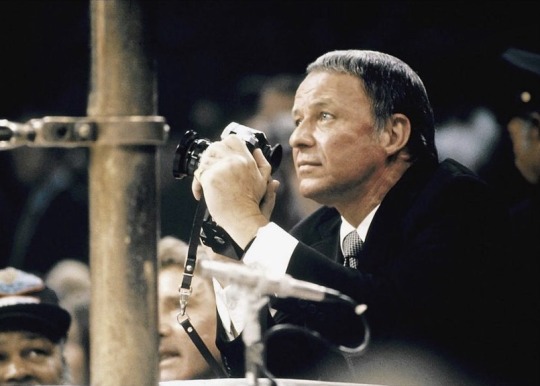
Frank Sinatra snaps photos of “The Fight of the Century,” between Muhammad Ali and Joe Frazier, as a guest photographer for Life magazine. Burt Lancaster, who can be seen next to Sinatra, was a commentator for the closed-circuit broadcast team, 1971.
11 notes
·
View notes
Text

Burt Lancaster by Glenn McCurdy. Photo taken at Joe Frazier's gym on North Broad Street, Philadelphia, 1969. Photographer’s note: I was doing a documentary for ABC on Joe Frazier at the time and Lancaster was a big fan of Joe and came to several of his training sessions. Later on he gave the hat he is wearing to Joe.
3 notes
·
View notes
Photo


NOIR CITY 20 at Oakland's Grand Lake Theatre Day 9: Matinée-NIGHT HAS A THOUSAND EYES (1:00) & ALL MY SONS (3:00). Matinée screenings introduced by Alan K. Rode. Evening shows by Eddie Muller. Full festival and tickets: www.NoirCity.com
1:00 PM
NIGHT HAS A THOUSAND EYES
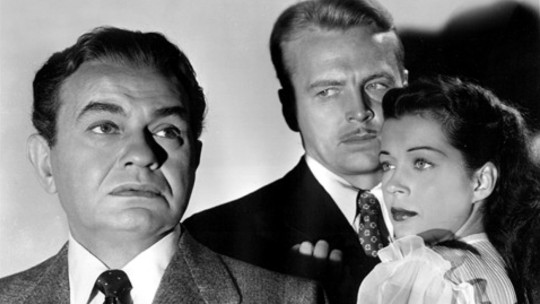
In this rarity, Edward G. Robinson stars as John Triton, a phony vaudeville mentalist who is one day cursed with the actual ability to predict the future. Gail Russell is the heiress who seems doomed by Triton's vision of her death. Or is it a scheme to steal her impending inheritance? John Farrow, a director at his most stylish in noir terrain, adapts from the novel by master of suspense Cornell Woolrich. Co-starring John Lund and William Demarest. Universal Pictures struck this print exclusively for NOIR CITY back in 2008.
Originally released October 13, 1948. Paramount [Universal], 81 minutes. Screenplay by Jonathan Latimer and Barré Lyndon, from the novel by Cornell Woolrich. Produced by Endre Bohem. Directed by John Farrow.
3:00 PM
ALL MY SONS

Edward G. Robinson gives one of his most affecting performances as successful businessman Joe Keller, grappling with guilt over having framed his business partner for a crime he committed. When his son (Burt Lancaster) becomes engaged to the convicted man's daughter, the sins of the past come hurtling back. Reis and writer-producer Chester Erskine—aided by the noir-stained cinematography of Russell Metty—create a powerful (and inexplicably rare) version of Arthur Miller's Tony Award-winning play. First time at NOIR CITY!Originally released March 27, 1948. Universal–International, 94 minutes. Screenplay by Chester Erskine, from the play by Arthur Miller. Produced by Chester Erskine. Directed by Irving Reis.
#night has a 1000 eyes#edward g robinson#john lund#Gail Russell#all my sons#burt lancaster#35mm screening#noir city#alan k rode#film noir foundatioin#noir city 20#film noir festival
26 notes
·
View notes
Text
COLUMBUS, Ohio – An Ohio man will receive $1.3 million from the state of Ohio as compensation for the 21 years he spent in prison for a reported home invasion and robbery that perhaps never occurred.
Ralph Blaine Smith will split the amount with his lawyers, who in December filed a wrongful imprisonment claim against the state in the Ohio Court of Claims. A settlement agreement between the two parties was reached shortly thereafter.
On Monday, the Ohio Controlling Board approved the release of the settlement payment to Smith for his wrongful imprisonment claim.
Reached by phone Tuesday, Smith said the settlement will allow him to take care of his family.
"They helped me out a lot when I was incarcerated with visits and phone calls. I'd like to make things a little easier on them," he said.
Smith was accused of being one of two Black men who forced their way into a Lancaster home that was occupied by a man and a woman and their young children on Feb. 2, 2000. The adults told police the intruders reportedly forced one of them to open a safe, from which they stole rare comic books and approximately $10,000 in cash.
Canada: Gunman in Canadian mass shooting had feud with condo board; 3 of 5 victims board members, police say
Chicago: A corrupt cop destroyed hundreds of lives. Now victims want justice.
Judge claims prosecutors withheld evidence
The prosecution's case hinged entirely on the two adult victims identifying Smith from a photo array, which they reaffirmed in court testimony. There was no other evidence linking Smith to the crime, and no one else has been charged in the case. None of the items reported stolen was recovered.
Fairfield County Common Pleas Judge Richard E. Berens in June 2021 granted Smith a new trial, ruling that prosecutors at the time had withheld evidence that suggested the crime never occurred.
Fairfield County Prosecutor Kyle Witt, who wasn't the prosecutor at the time of Smith's conviction in August 2000, later decided to drop all charges against Smith rather than pursue a second trial.
The motion for a new trial for Smith focused on evidence suggesting that the crime may have been staged. Among the pieces of evidence that county prosecutors at the time failed to provide to the defense was a narrative supplement, written by one of the first police officers to arrive at the residence after the reported robbery.
That supplemental narrative "contains numerous observations expressing skepticism about whether a crime had occurred," Berens stated in his order granting Smith a new trial. The responding officer wondered how multiple men could have conducted an armed home invasion and fled the Lancaster house without leaving tracks in the snow that covered the area.
Berens determined that evidence was "exculpatory," meaning that it could create reasonable doubt about the defendant's guilt and that prosecutors were required to share it with the defense.
Smith also is pursuing a federal lawsuit against the Pickerington police detective who investigated his case, the city of Pickerington and Fairfield County. Depositions in that case are ongoing, said Columbus defense attorney Joe Landusky.
Also named as a defendant in that lawsuit filed in January 2022 in the U.S. District Court in the Southern District of Ohio in Columbus was then-Fairfield County Prosecutor Gregg Marx, who handled Smith’s case. But U.S. District Chief Judge Algenon L. Marbley in November dismissed the claims made against Marx, court records show.
#nunyas news#they need to start garnishing the pensions#of cops and prosecutors#who pull shit like this
28 notes
·
View notes
Text
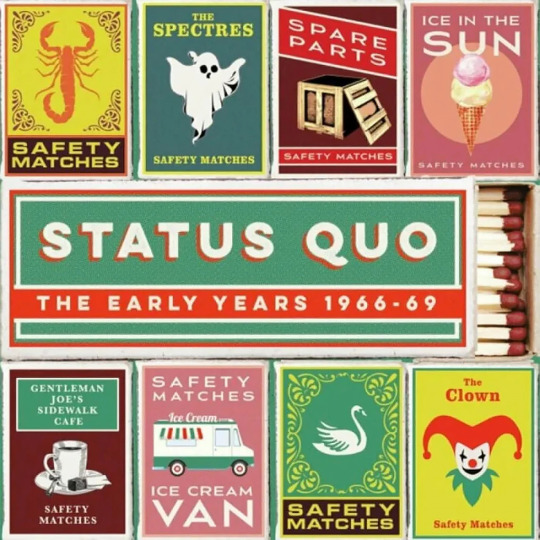

Status Quo
The Early Years 1966-69
2024 BMG
—————————————————
Tracks CD One:
Picturesque [Mono]
01. Black Veils of Melancholy
02. When My Mind Is Not Live
03. Ice in the Sun
04. Elizabeth Dreams
05. Gentleman Joe’s Sidewalk Café
06. Paradise Flat
07. Technicolor Dreams
08. Sheila
09. Spicks and Specks
10. Sunny Cellophane Skies
11. Green Tambourine
12. Pictures of Matchstick Men
Spare Parts [Mono]
13. Face without a Soul
14. You’re Just What I Was Looking for Today
15. Are You Growing Tired of My Love
16. Antique Angelique
17. So Ends Another Life
18. Poor Old Man
19. Mr. Mind Detector
20. The Clown
21. Velvet Courtains
22. Little Miss Nothing
23. When I Wake
24. Nothing at All
Tracks CD Two:
Picturesque [Stereo]
01. Black Veils of Melancholy
02. When My Mind Is Not Live
03. Ice in the Sun
04. Elizabeth Dreams
05. Gentleman Joe’s Sidewalk Café
06. Paradise Flat
07. Technicolor Dreams
08. Sheila
09. Spicks and Specks
10. Sunny Cellophane Skies
11. Green Tambourine
12. Pictures of Matchstick Men
Spare Parts [Stereo]
13. Face without a Soul
14. You’re Just What I Was Looking for Today
15. Are You Growing Tired of My Love
16. Antique Angelique
17. So Ends Another Life
18. Poor Old Man
19. Mr. Mind Detector
20. The Clown
21. Velvet Courtains
22. Little Miss Nothing
23. When I Wake
24. Nothing at All
Tracks CD Three:
The Spectres
01. I (Who Have Nothing)
02. Neighbour, Neighbour
03. Hurdy Gurdy Man
04. (Her Name Was) Laticia
05. (We Ain’t Got) Nothing Yet
06. I Want It
07. Spicks and Specks
08. Walking with My Angel
09. When He Passed You By
10. Love in Vain
11. Say that You Need Me
12. Neighbour Neighbour [alternate version]
BBC Session, Saturday Club – 10/9/66
13. Gloria
14. Interview With Francis Rossi
15. I (Who Have Nothing)
16. Neighbour, Neighbour
17. Bloodhound
18. Bird Dog
Traffic Jam
19. Almost but Not Quite There
20. Wait Just a Minute
BBC Session, Saturday Club – 24/6/67
21. I Don’t Want You
22. Almost But Not Quite There
23. It Takes Two
24. Spicks and Specks
Tracks CD Four:
A-Sides, B-Sides, Demos & Outtakes
01. To Be Free
02. Make Me Stay a Bit Longer
03. Auntie Nellie
04. Are You Growing Tired of My Love
05. The Price of Love
06. Little Miss Nothing
07. Nothing at All [demo excerpt]
From Spare Parts Sessions
08. Josie
09. Do You Live in Fire
10. Pictures of Matchstick Men [mix of an alternate version]
11. Paradise Flats [alt version stereo by Mike Brown 1998 remaster]
12. Hey Little Woman (You’re Just What I Was Looking for Today [alternate version]
13. The Price of Love [alternate version]
14. Auntie Nellie [stereo remix]
15. Josie [alternate mix]
16. Pictures of Matchstick Men [mix of alternate version]
Tracks CD Five:
BBC In Session, 1968-1969
01. Spicks and Specks [David Symonds 22/1/68]
02. Judy in Disguise [David Symonds 22/1/68]
03. Pictures of Matchstick Men [David Symonds 22/1/68]
04. Interview with Brian Matthew [Saturday Club 17/2/68]
05. Pictures of Matchstick Men [Saturday Club 17/2/68]
06. Things Get Better [Saturday Club 17/2/68]
07. Gloria [David Symonds 29/3/68]
08. Interview with Alan Lancaster [David Symonds 29/3/68]
09. Black Veils of Melancholy [David Symonds 29/3/68]
10. Bloodhound [David Symonds 29/3/68]
11. Ice in the Sun [Saturday Club 30/7/68]
12. When My Mind Is Not Live [Saturday Club 30/7/68]
13. Paradise Flats [Saturday Club 30/7/68]
14. Interview [Symonds on Sunday 27/1/69]
15. Make Me Stay a Bit Longer [Symonds on Sunday 27/1/69]
16. Are You Growing Tired of My Love [Symonds on Sunday 27/1/69]
17. The Price of Love [Symonds on Sunday 27/1/69]
18. The Price of Love [Symonds on Sunday 31/3/69]
—————————————————
John Coghlan
Alan Lancaster
Roy Lynes
Rick Parfitt
Francis Rossi
* Long Live Rock Archive
#StatusQuo#Status Quo#John Coghlan#Alan Lancaster#Roy Lynes#Rick Parfitt#Francis Rossi#The Early Years 1966-69#Compilation#Box Set#Boogie#2024
2 notes
·
View notes
Text
Thursday, March 14, 2024
The US has its first presidential rematch since 1956
(AP) Just when Americans thought they were out, Joe Biden and Donald Trump pulled them back in. The sequel to the 2020 election is officially set as the president and his immediate predecessor secured their parties’ nominations. Biden and Trump have set up a political movie the country has seen before—even if the last version was in black and white. The last presidential rematch came in 1956, when Republican President Dwight D. Eisenhower again defeated Adlai Stevenson, the Democratic opponent he had four years prior. Grover Cleveland, meanwhile, was the nation’s 22nd and 24th president, winning elections in 1884 and 1892.
Congress is becoming less productive
(Reuters) The U.S. Congress is navigating yet another government funding deadline—the eighth in less than six months—and are at an impasse over sending aid to key allies in Ukraine, Taiwan and Israel. Divisions among Republicans in the House and Senate killed a major bipartisan border policy bill. Reforms to bedrock programs like Medicare and Social Security are desperately needed but no closer to getting passed. Meanwhile, the House of Representatives spent close to a month without a speaker last year due to infighting between moderate and hard right factions of the Republican party. When U.S. Representative Chip Roy, a Republican from Texas, begged his colleagues in November to “give me one thing I can campaign on and say we did,” he was articulating what many lawmakers and observers were feeling: Congress isn’t working. The simplest expression of this is the number of bills passed by Congress. Just twenty-seven bills were passed last year—a record low.
In yearly Pennsylvania tradition, Amish communities hold spring auctions to support fire departments
(AP) A couple hundred used buggies—horses not included—were lined up and ready for the auctioneer’s gavel last weekend when day began at the Gordonville mud sale, a local Amish tradition dating to the 1960s. Mud sales are country auctions that benefit volunteer fire departments across what the Amish community refers to as the Lancaster settlement, located some 70 miles (113 kilometers) west of Philadelphia where the devout Christian group began to settle about 300 years ago. They don’t sell mud, although a cold rain brought plenty of it. The name refers to early spring, when wet fields have begun to thaw but may not be ready for the plow. Gordonville’s mud sale, one of at least a dozen being held this spring in the region, drew thousands of bidders and was expected to net the fire department about $100,000, about 10% of the total proceeds. Amish people make and donate much of the food and sale items and are the buyers of most of the buggies and the array of horse-drawn farm equipment.
As leader resigns, Haitian politicians rush to form new government
(Washington Post) Haitian leaders scrambled Tuesday to meet a 24-hour deadline to set up a panel that will lead the deteriorating country to new elections following the resignation of Prime Minister Ariel Henry. Kenyan officials, meanwhile, said they were putting the deployment of a U.N.-approved multinational security force to the beleaguered Caribbean nation on pause until a new government is in place, according to media reports. A senior U.S. State Department official said the transitional presidential council would select an interim prime minister and government in “the very near future” and the mission should “go forward without delay.” Perhaps the greatest question: Would the gangs that helped push Henry allow the transition to a new authority?
Germany hit by new wave of airport, train strikes
(DPA) Germany has again been hit by a double wave of strikes in the transport sector, as train drivers and aeroplane cabin crews stopped work on Tuesday in ongoing wage disputes. Around 80% of long-distance trains were cancelled on Tuesday as train drivers from the state-owned rail company Deutsche Bahn went on strike. At major air hubs Frankfurt and Munich, tens of thousands passengers were having to reschedule their flights due to a two-day strike by the cabin crew union Ufo at Lufthansa. Individual flights were also cancelled at other locations such as Berlin's international airport.
‘Jamming’: How Electronic Warfare Is Reshaping Ukraine’s Battlefields
(NYT) The Ukrainian soldier swore and tore off his headset. His video monitor had gone blurry at first, the landscape of shattered trees and shell craters barely visible, before blacking out completely. The Russians had jammed the signal of his drone as it was flying outside the town of Kreminna in eastern Ukraine. For a while, the Ukrainians enjoyed a honeymoon period with their self-detonating drones that were used like homemade missiles. The weapons seemed like an effective alternative to artillery shells for striking Russian forces. Now, the bad days are starting to outweigh the good ones: electronic countermeasures have become one of the Russian military’s most formidable weapons after years of honing their capabilities. Electronic warfare remains a hidden hand in much of the war, and like Ukraine’s disadvantage in troop numbers and ammunition supplies, Ukraine suffers in this area as well in comparison to Russia. Russia has more jamming equipment capable of overpowering Ukrainian signals by broadcasting on the same frequencies at higher power. It also exhibits better coordination among their units.
Naval drones versus Russian warships
(BBC) The secretive G-13 unit of Ukraine’s military intelligence agency was behind the sinking of the Sergey Kotov warship last week, its fifth downing in the year since it’s been in operation. The group’s not-so-secret weapons are naval drones—cheap, unmanned and lethal. The Magura V5, named after a Slavic goddess of war, looks like a small motorboat with a flat surface instead of passenger seats. “It doesn’t emit a lot of heat, so it’s almost invisible for thermal cameras. It’s made from plastic, therefore even radars struggle to see it,” says the unit’s commander. Produced by the Ukrainian armed forces, the drone’s claimed range is 800km (500 miles), so it can easily reach the Crimean peninsula and even the Russian coastline. It can allegedly carry 250kg of payload, enough to sink a warship.
Putin warns the West: Russia is ready for nuclear war
(Reuters) President Vladimir Putin warned the West on Wednesday Russia was technically ready for nuclear war and that if the U.S. sent troops to Ukraine, it would be considered a significant escalation of the conflict. Putin, speaking just days before a March 15-17 election which is certain to give him another six years in power, said the nuclear war scenario was not “rushing” up and he saw no need for the use of nuclear weapons in Ukraine. “From a military-technical point of view, we are, of course, ready,” Putin, 71, told Rossiya-1 television and news agency RIA in response to a question whether the country was really ready for a nuclear war. Putin said the U.S. understood that if it deployed American troops on Russian territory—or to Ukraine—Russia would treat the move as an intervention.
Chinese trust goes bust, reflecting turbulent economy
(AP) Some investors in a troubled trust fund in China are facing financial ruin under a government plan to return a fraction of their money, casualties of a slump in the property industry and a broader economic slowdown. Sichuan Trust, headquartered in the southwest city of Chengdu, announced it was insolvent in 2020, stricken by sketchy accounting and failed investments in shopping malls and other projects. A deadline earlier this month to accept a 20%-60% “haircut” or loss on their investments has left some investors in deep financial trouble. China’s economy, the world’s second largest, depends heavily on real estate development to drive growth and create jobs. Property prices and sales have languished after a crackdown on what leaders viewed as dangerous levels of borrowing, causing dozens of developers to default on their debts. The ruling Communist Party faces a dilemma: Debt is a problem, but falling home prices lead people to scrimp on spending. That squeezes companies’ sales, so they lay off workers and cut back on investment. The result: slowing growth and less wealth to go around.
Medics say they were ‘humiliated’ in raid
(BBC) For several weeks, Alice Cuddy and several of our colleagues have been investigating what went on when the Israel Defense Forces (IDF) raided Gaza’s Nasser hospital last month. It was at the time one of the few medical facilities still functioning in the Strip. Intelligence, the IDF said, indicated the presence of Hamas operatives—a claim denied by Hamas. Some hostages who got out of Gaza said they had been held at Nasser. Since the raid, Palestinian medical staff in Gaza have told the BBC they were blindfolded, detained, forced to strip and repeatedly beaten by Israeli soldiers. Doctor Ahmed Abu Sabha, whose account closely matches those of two medics who wished to remain anonymous, described being detained for a week. Muzzled dogs were set upon him and his hand was broken by an Israeli soldier, he said. The three men told the BBC they were beaten, doused with cold water, and forced to kneel in uncomfortable positions for hours. The IDF did not comment on the specific allegations, but said “any abuse of detainees is contrary to IDF orders”.
A Ramadan of ‘sadness’ as war-weary Gazans go hungry
(Washington Post) For Mahasen Khateeb, the Muslim holy month of Ramadan used to be a time of lavish dinners, family gatherings, communal prayers and gift giving. “All of that is gone,” the 31-year-old graphic designer said by phone from Jabalya, in northern Gaza, which humanitarian groups warn is on the brink of famine after months of Israeli siege and bombardment. Khateeb doesn’t have enough food for suhoor, the traditional meal eaten before dawn, when the day-long Ramadan fast begins. On Tuesday for iftar, the post-sunset meal when people break their fast, she planned to make rounds of bread topped with canned tomato sauce. Her brother risked his life, she said, to get a bag of flour during a rare and chaotic aid delivery last week. “This situation isn’t new with Ramadan,” she said. “We’ve already been fasting for more than a month. … There are no food products to buy and eat.” Khateeb said she has mainly been subsisting on green leafy plants that grow with the winter rains and die out as spring approaches. 16 children have died of malnutrition in aid-starved Gaza, health officials say
A ship carrying 200 tons of food is heading to Gaza
(Washington Post) A ship carrying nearly 200 tons of food left Cyprus on Tuesday to deliver desperately needed aid to the Gaza Strip, where concerns are mounting over the worsening humanitarian situation. The journey, if successful, would mark the first shipment of aid into Gaza via a new maritime route—but the supplies the ship is carrying represent only a fraction of the amount of aid needed after five months of a devastating war that has killed more than 31,000 Palestinians, according to the Gaza Health Ministry. The mission is being undertaken by World Central Kitchen, the aid organization founded by celebrity chef Andrés, who is based in Washington. “We have served more than 35 million meals in Gaza & the maritime corridor will allow us to provide millions more,” the group said.
Zimbabwe, After Expelling U.S. Officials, Accuses Them of Promoting ‘Regime Change’
(NYT) The government of the southern African nation of Zimbabwe detained, interrogated and deported officials and contractors working for the United States government last month, and this week accused them publicly of promoting “regime change” in their country. The incident is the latest in the Zimbabwean government’s aggressive efforts to thwart both domestic and international challenges to its authority. The incumbent government claimed victory in a chaotic election last year that several independent observer missions said lacked fairness and credibility. But it also points to a deeper tension over the United States’ proclaimed efforts to promote democracy around the globe. Some nations, including Zimbabwe, have accused America of meddling in their affairs and attempting to impose its values—as well as of hypocrisy, given the threats at home to its own democracy.
2 notes
·
View notes
Note
You should have heeded the knuckle joe’s warning, stardust….
The Hershey's Milk Chocolate Bar (commonly called the Hershey's Bar, or more simply the Hershey Bar) is a flagship chocolate bar manufactured by The Hershey Company. Hershey refers to it as "The Great American Chocolate Bar". The Hershey Milk Chocolate Bar was first sold in 1900.
first successful confectionery business, Lancaster Caramel Company, which was founded in 1886. After seeing German chocolate manufacturing machinery at the World's Columbian Exposition of 1893 in Chicago, Hershey decided to go into the chocolate making business. After purchasing the chocolate processing machinery, Hershey began by applying chocolate coatings to the caramels. The next year, 1894, Hershey founded the Hershey Chocolate Company and incorporated it as a subsidiary of the Lancaster Caramel Company. The Hershey Chocolate Company developed its own line of chocolate products, marketed as "sweet chocolate novelties" to distinguish them from unsweetened baking chocolate. After developing the Hershey process to mass-produce chocolate in 1899, Hershey sold the Lancaster Caramel Company in August of the year 1900, and kept the chocolate manufacturing business.[5] In November of that same year, Hershey began to produce and sell the Hershey chocolate bar.

5 notes
·
View notes
Text
When I was about ten or twelve, my father used to take me to the movies fairly frequently. He'd always done it grudgingly, however, so that only later did it occur to me that he probably got a kick out of such movies too: for over those years, he took me with him to see Mighty Joe Young, The Day the Earth Stood Still, It Came From Outer Space, This Island Earth, and Fort Ticonderoga (because, like Outer Space, it was in 3-D). My memories of those pleasant times are tarnished by the fact that, when he would grow angry at me, he would punish my transgressions (usually, at least in my memory, fairly small ones, like speaking to him in the wrong tone of voice or some other minor enthusiasm of mine he would take as disrespect) by not taking me to see the one that I wanted to.
Once he forbade me to see House of Wax (also in 3-D), as punishment for what I no longer remember. (A film I also had already missed, as another punishment, was The Five Thousand Fingers of Dr T, whose coming attractions I'd seen with my dad at another picture and been dazzled by.) When I went to spend my spring vacation with Mom over at my cousins' in New Jersey, Dorothy (three years my senior) had taken me to see Call Me Madam with Ethel Merman and Donald O'Connor (whom I instantly fell in love with, and went tap dancing around the house till I had to be told to stop), and Oh, You Beautiful Doll. And, after I went to see it with Boyd (five years older than I), I carried on so much about Burt Lancaster's acrobatic performance in The Flame and the Arrow, that, when my father came over to visit us in Jersey, he scowled and said, "Didn't I forbid you to see that ...?"
"No, Dad!" I protested with a sudden chill of guilt and fear, with the inchoate feeling every child has at such parental accusation that, deeply and unknowingly, they've done something wrong. "That was House of Wax ...!"
"Oh ..." he said (while Dorothy and Boyd glanced at each other uncomfortably, thinking their young cousin had tricked them into violating an unknown parental prohibition). "Are you sure ...?" unable quite to understand how I could have enjoyed something so much unless it was in violation of his will.
from The Motion of Light In Water, Samuel R. Delany
12 notes
·
View notes